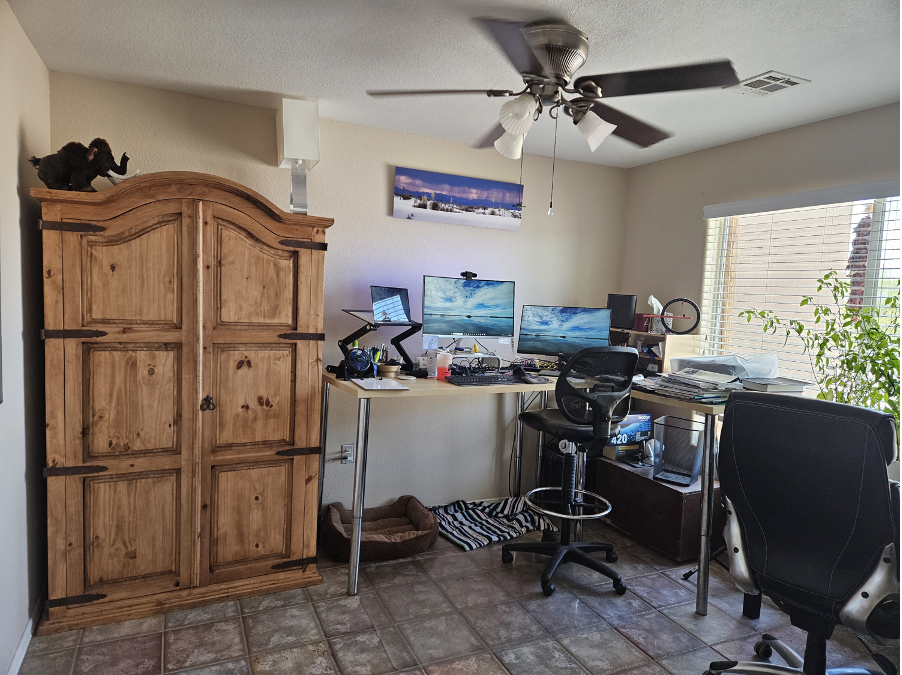 School name: Highline College (emerita) and New Mexico State University (NMSU; affiliate faculty)
School name: Highline College (emerita) and New Mexico State University (NMSU; affiliate faculty)
Type of school: Highline College is a community college. NMSU is an R2 Hispanic Serving institution.
School locale (including state and country): Highline is in Des Moines, Washington, US. NMSU is in Las Cruces, New Mexico, US.
How many years have you taught psychology? The first class I taught entirely on my own was 33 years ago when I was in grad school.
My first full-time teaching job was at New Mexico State University-Alamogordo, a two-year branch. I left there in 2001 to go to work for Highline College, located just south of Seattle. In 2021, we moved back to Las Cruces, NM, home to NMSU’s main campus. I teach Intro Psych for NMSU when it fits my schedule. My retirement from Highline will be official in September 2023.
Classes you teach: Intro to Psychology, Social Psychology, and Research Methods. I have taught many others, but these have been my courses for the last several years.
Average class size: At Highline, my online classes averaged 30 students. At NMSU, my face-to-face classes cap at 80.
What’s the best advice about teaching you’ve ever received? “If I don’t have at least one negative student course evaluation, then I haven’t been doing my job.” This was uttered by a Political Science professor. He explained that he wanted to challenge students. If at least one student didn’t complain about the course content or the work in the course, then he didn’t feel like he was challenging his students enough. I don’t know that I have fully embraced his thinking, but it has kept me from obsessing over those occasional negative evaluations in a sea of positive ones.
“Students have a right to fail.” This was an academic counselor speaking at a faculty meeting. She said that while she knew that many of us bent over backwards to help students succeed, she reminded us that students have to take responsibility for their own learning. Students have to meet us at least halfway. When students would come to her office and start talking about their struggles in a particular course, her first question to them was, “Are you reading the textbook?” If the answer was no, she would say, “We’re done. Read the textbook. If you’re still struggling after that, then come back and see me.” After hearing this, I stopped taking sole responsibility for my students who did poorly in the course.
What book or article has shaped your work as a psychology teacher? What had the greatest impact on me as a teacher didn’t come from a book. It came from a rock musician. When I started my teaching career my greatest weakness was in public speaking. I had been to a number of Melissa Etheridge concerts and I was struck by how she could hold an audience’s attention, so I started paying attention to what she did. Even though she was speaking to an audience of a few thousand, her style was conversational. Other performers maintain the actor’s fourth wall, the wall between the performance and the audience; I’ve seen instructors do the same thing. In her concerts, that wall is non-existent. I figured if she can be conversational in her style, so can I, and I even have an advantage! With my class sizes, my students can converse back. Although there is one technique Etheridge employs that does allow the audience to converse with her: Call and response. I sprinkle this in wherever I can. I say something, and the students respond as a class. For example, after covering the neuron, this is how I conclude my lecture.
Me: What are the chemical messengers called?
Class: Neurotransmitters!
Me: They float across the empty space called the…?
Class: Synapse!
Etc.
Briefly tell us about your favorite lecture topic or course to teach. Introduction to Psychology is my favorite course to teach, because I love the challenge of covering such a large number of topics. Most of us receive graduate training in one area, and then have to bring ourselves up to speed on the rest of the course content, and I am no exception. I like to think of the Intro Psych course as an owner’s manual for the human mind. We explore how everything works and then end the course talking about troubleshooting. What happens when things don’t quite work as they should? And what can we do about that?
There is no other course in the psychology curriculum that has the impact Intro has. The vast majority of students who take Intro are not destined to be psychology majors. They will major in other fields, and then go on to work in industry, business, medicine, law, etc. Intro Psych is our one opportunity to help future leaders and decision makers grasp how important the field of psychology is.
What teaching and learning techniques work best for you? I am a big fan of interteaching because it puts the responsibility for learning back into the hands of the students. I’ve written blog posts about it, such as this one from 2019. Garth Neufeld and I did a webinar on interteaching in 2023; watch the free recording here.
 What’s your workspace like? The photograph above my desk is White Sands National Park located 50 miles from where I live. Here in the Mesilla Valley of southern New Mexico, chile peppers are a big part of our agricultural economy. The plants by the window are chile peppers, and outside a ristra, a decorative hanging made of dried red peppers.
What’s your workspace like? The photograph above my desk is White Sands National Park located 50 miles from where I live. Here in the Mesilla Valley of southern New Mexico, chile peppers are a big part of our agricultural economy. The plants by the window are chile peppers, and outside a ristra, a decorative hanging made of dried red peppers.
What is your teaching philosophy in 8 words or fewer? Students are responsible for their own learning.
Tell us about a teaching disaster (or embarrassment) you’ve had and how you dealt with the situation. In class, a student asked a question. As I was answering it, I was reminded of a video I had seen that would help illustrate my point. I did a quick search of YouTube and started playing the video. It was the wrong video. The video I was showing was an offensive parody of the one that I had wanted. I quickly stopped it, said something like, “That was clearly the wrong one,” did a more careful search, and finally played the right one.
The lesson? Just as trial lawyers are told to never ask a question of a witness in court that they don’t already know the answer to, the same holds for instructors playing videos in class. Don’t play a video unless you know what is in the video.
What about teaching do you find most enjoyable? The best part about teaching is helping students learn. There is nothing better than watching the light bulb come on.
What is something your students would be surprised to learn about you? I started using my own Intro Psych textbook for the first time this past January. Some of my students were surprised to learn that I was one of the authors.
What are you currently reading for pleasure? I just finished SPQR by Mary Beard. It’s a terrific history of the Roman Empire.
I’m now working my way through Stephen Spotswood’s Pentecost and Parker mysteries. I just started the second one in the series, Murder Under Her Skin.
What tech tool could you not live without? There are several, but with the amount of writing I’ve been doing, I could not live without Zotero. It’s a top notch pdf and reference manager.
What is your hallway chatter like? I work entirely from home, so most of my chatter is telling my dogs to stop barking.
BONUS LINKS: listen to Sue on the PsychSessions podcast!
GST001: Garth and Sue Talk...Season 1 Promotion/Premiere
E004: Sue Frantz: Knows a Thing or Two about Teaching Diverse Students
E158: Sue Frantz, Part 2: Innovator, Author, Technologist, Pedagogical Specialist
